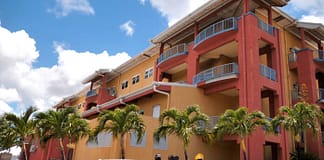
A scientific study has uncovered a potential source of chemicals onboard certain LIAT ATR planes that may pose a long-term risk to crew and passengers travelling on those aircraft.
This finding from the probe, which was ordered by the island-hopping airline following complaints from a number of pilots that they were falling ill at the end of their flights between 2016 and just before the company collapsed in 2020.
In his February 18, 2019 report, environmental scientist Dr Linroy Christian from Antigua and Barbuda who conducted the study said a link was made between the cause of a variety of respiratory problems, allergic reactions, headaches and other health issues experienced by the pilots, to contaminated air quality inside the aircraft.
When contacted, Dr Christian told Barbados TODAY he was not sure if any of the recommendations were implemented by LIAT, but explained that he was scheduled to conduct a follow up study which did not materialize because the air carrier collapsed a year ago.
“The physical inspection of the aircraft identified the accumulation of dust and fibres on surfaces within the flight deck and the main cabin. Also, the accumulation of dust and other visible material were observed within the mixing chamber, recirculating fan, and supply ducting of the air conditioning/recirculation system,” the scientific consultant found.
He also discovered that filtration of the recirculating air does not occur, which he pointed out, leads to impaction of particles on the blades of the recirculating fan, within the mixing chamber, and the supply ducting.
“The housing of the recirculating fan was lined with foam that was inundated with dust and a soot-like material. The deposition of this sooty material should be further analysed as a potential source of chemicals that may pose a long-term risk to crew and passengers,” he revealed.
The environmental health expert wrote that the inspection of the ground air conditioning units further identified an additional source of potential allergens.
“The intake filters of the units were inadequate and as a result would not effectively restrict
fine particles from entering the evaporator coils and ducting. This has led to the impaction of potential allergens on the evaporator coils and the interior of the flexible supply ducting,” according to the findings.
“Additionally, the units were not maintained according to a defined and documented schedule and standard procedures were not apparent for conducting the maintenance. With respect to the active sampling and characterisation of suspended particulates that were potentially allergenic in nature, LIF (one type of ATR plane) recorded the highest levels for synthetic fibres, opaque particle, fibre glass, fungi and black particles. This is indicative of the increased potential for the circulating air to elicit an allergic reaction in sensitive occupants,” the scientist declared.
He also disclosed in his report, that the skin cell fragment level was excessively high within LIF, “which is a direct indication of the inadequacy of air filtration and housekeeping practices.”
Dr Christian also reported that two other types of ATRs – the LIA and LIB – recorded moderate levels of skin cell fragments.
However, he noted that the total particle load for LIF was significantly greater than all other aircraft, with LIA and LIB recording levels that were marginally within the recommended acceptable range.
But even though the pilots who were adversely affected by the environmental problems are no longer employed by LIAT, Barbados TODAY has learnt that some of those who were kept on to fly the planes, have been experiencing health challenges similar to those of their former work colleagues.
The company, which suspended its services in April 2020 due to the impact of the COVID-19 pandemic, returned to flying on November 1, 2020 with its first daily flight from Antigua to Dominica, on a limited schedule.
The 600-page report which produced 21 recommendations, sparked the filing of a class action claim last year against LIAT. It was lodged in the Eastern Caribbean Supreme Court in Antigua and Barbuda by five pilots who were among hundreds of staff members terminated as part of a restructuring process to try to stave off liquidation.
The ex-pilots are accusing the company of frustrating their efforts to access the courts to get justice for the years of suffering from being forced to fly “sick” planes.
In their statement of claim that’s before the court, the five former LIAT pilots said the company, being fully aware that they got ill from working in its aircraft, nevertheless caused them to continue to work in the poor air-quality environment.
“At all material times, it was reasonably foreseeable that the claimants would become ill once on board the aircraft. With regard to the third and fourth claimants, the defendant continued to have them work in the unhealthy work conditions until they got so ill that, in the defendant’s view, they had to be medically boarded and terminated,” the court document read.
“In all the circumstances, the claimants, during the course of their employment with the defendant have suffered personal injuries due to the defendant’s negligence and/or recklessness, having breached its duty of care to the claimants to provide a safe place of employment,” the suit added.
The former LIAT pilots are also alleging that the airline authorities were dragging their feet on implementation of the recommendations in the scientific study.
Among the 21 recommendations made by Dr Christian were that immediate in-depth remedial measures should be instituted for the LIF aircraft; that during scheduled C checks the air conditioning and recirculation system are specifically addressed and to improve daily and in-depth maintenance and ensuring that vacuuming is used routinely for cabin housekeeping.
He also recommended that a schedule of deep-cleaning should be developed to remove particles from vents, zone sensors, instrument panels, mixing chamber and baggage hold.
The scientist further suggested investigating the possibility of duct cleaning as a maintenance activity and that pilots prone to hyper-allergenic responses should not operate the aircraft identified in the study until remedial measures have been instituted.
Administrator of LIAT, Cleveland Seaforth, who is overseeing the airline’s restructuring process, could not be reached for comment and Director of Flight Operations, Captain Arthur Senhouse declined to speak. — Barbados TODAY
Advertise with the mоѕt vіѕіtеd nеwѕ ѕіtе іn Antigua!
We offer fully customizable and flexible digital marketing packages.
Contact us at [email protected]

















Whaaaat?????? LIAT aircraft so nasty and unkept that they causing passengers and their flight crew to get sick?? According to Dr Christian the air in the planes that paying people breathing have unhealthy chemicals like fibers, fungi, black soot, oil particles, human flesh, and cancer causing chemicals!!!
WTF LIAT???????
And Management knew about this since 2016 but yet had dem pilots and flight attendants work in that sick air?? And force them to fly even when dem complain about they health??? Even fire a couple of them when they get sick from working in these NASTY planes!!!
Please remember it was Dr Christian who was paid by LIAT to do this report!!! Wow
WTF LIAT ???? What were u thinking LIAT Management ???? So cruel and wicked and sick allyou be jack??
And to mek matters worse these poor people can’t even get their severance!!! What a ting LIAT. What a ting…..Shame shame shame on Management. The Director of Flight Operations who always talking cannot talk now???
Who will now want to fly on these sick causing planes especially at them exorbitant prices!!! Mr PM, is this what you spending half a million dollars of employee severance money on?? If this is the dagger in LIAT heart what will you say to the employees especially the ones who get sick while working on those nasty planes?? Where they severance money gorn??}
Shame shame shame. COVID, sick planes, wicked Management
I challenge any member of Liat’s management to refute the contents of this article. I am willing to wager my right arm that they are completely unable to show that this is fabricated.
Comments are closed.